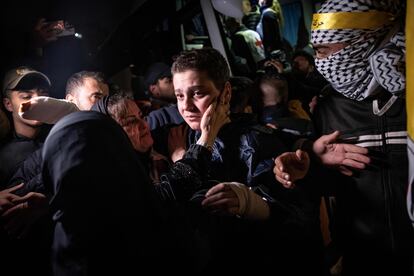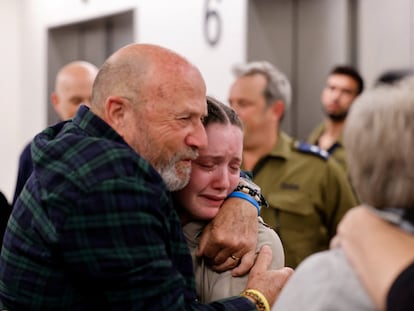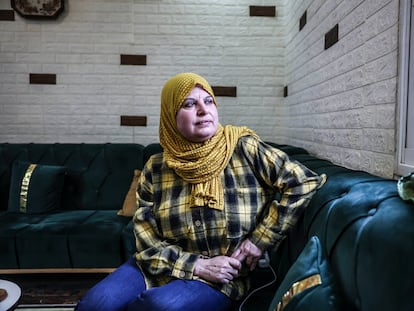The Gaza war also rocks Israel’s Palestinian prisoners: ‘At every count I wanted to die’
Women and young people freed through the Israel-Hamas truce explain how conditions hardened after the October 7 attacks, with beatings, overcrowding, humiliation and insults

“Every time they called me for the head count I wanted to die,” says Mohamed Nizzal, an 18-year-old Palestinian who was released last Sunday after three months in an Israeli prison. He says he returned home with two broken fingers on his right hand but wasn’t even given painkillers. “They came to beat us with iron bars and I covered my head with my hands,” he recalls of the count one day, on November 18. The testimony of Nizzal is one of those gathered by EL PAÍS that shows the shock wave of the Hamas massacre of October 7 was immediately felt in the Israeli jails that house Palestinian prisoners.
Half a dozen prisoners released in recent days through the truce between Israel and Hamas agree — in a version not confirmed by the prison authorities — that conditions in the jails have become tougher since the current war began. They speak of beatings, overcrowded cells, humiliation, isolation from the outside world, and even smoke and pepper spray. Physical assaults have been reported by the released male prisoners. Female detainees have not said they suffered violence, but they also report a worsening in their treatment. Since the Hamas attacks on Israel, which left 1,200 people dead, “they have been taking revenge on us. They used to treat us like normal prisoners,” says Nizzal over the phone from his home in Qabatia, near Jenin in the northern West Bank. He had been held for three months under administrative detention — without charge or trial — in the Ktziot prison in the Negev desert.
This is not the case for Rawan Abu Zeyadeh, 29, who opens her eyes wide when she explains bluntly that she was sentenced to nine years for stabbing and wounding an Israeli soldier when she was 21. It was on her own initiative and happened on July 15, 2015, at the checkpoint that is permanently maintained by the Israeli army down the hill in front of her home in the West Bank village of Beitillu. That position is visible behind her as she conducts the interview. After the Hamas massacre, she explains that she was held for three days without a shower and the number of people in her cell rose from five to eight, meaning some prisoners had to sleep on the floor. The authorities at the Damun Prison in Haifa closed the commissary where they shopped, took away all electronic devices such as television, radio, and kettle, preventing them from cooking. Nor could they go out for walks during breaks and some remained in solitary confinement until the day of their release, says Zedayeh, who wears the traditional Palestinian kefiya around her shoulders, with her father at her side, listening attentively.

Azhar Assaf, 25, provides a similar description of conditions in Damun since October 7 from her home in Al Jeeb, in the West Bank. She was released last Friday in the first exchange carried out under the truce and she admits that when they saw news of the Hamas attack on television, they began to celebrate. The female prison officials, she says, then stormed the cell and over the past few weeks have used smoke and pepper spray canisters against those who, like Assaf herself, protested. In her cell, she adds, the number of inmates rose from three to nine.
She had been in jail for 14 months after being arrested on September 11, 2022, allegedly for trying to attack soldiers with a knife at a checkpoint near her home, at one of the crossing points from Jerusalem to the occupied West Bank. Her mother, Libia Othman, a Peruvian-born 50-year-old, denies that her daughter was armed and insists that there has not even been a trial. That day, in the morning, she was called on the phone: “Your daughter was planning to carry out an operation, but the [Israeli] shot missed her,” she recounts.
Omar al-Atshan, 19, makes no secret of the fact that one day in early 2022 he and six other Palestinians attacked members of the Israeli occupation forces near Ramallah with a pistol. He believes that being sentenced to three years as a minor has allowed him to benefit from the pact between Hamas and Israel. “On October 7, we saw what was happening on TV, but within 30 minutes they turned it off. They began to storm the cells, to beat us and humiliate us,” he says in the living room of his home, where, like a prodigal son, he keeps receiving visitors. The next day, he continues, the officials took away the TV and all other electronic devices. Three days later, they took away clothes and left prisoners with only one spare set. “Until October 7, they treated us like normal prisoners,” he says.
15 prisoners in one cell
In his cell in Ktziot, he says, the number of prisoners grew from four to 15, divided between two bunk beds and mattresses on the floor. Most of the assaults, he recalls, occurred during counts, which took place at 5 a.m., 11 a.m., and 6 p.m. “They would enter the cell and beat us with truncheons. They also assaulted us when we were transferred from one wing to another and insulted us in Arabic and Hebrew,” al-Ashtan says, as he tries to retrieve, with the help of his brother, the passwords to his Facebook and Instagram profiles.
On the street leading to the family apartment in Ramallah, the administrative capital of the West Bank, hang Fatah banners (the majority party in the Palestinian National Authority). There are posters bearing the young man’s face and even two banners on which he appears next to the late former Palestinian President Yasser Arafat. Fatah “sends warm congratulations and best wishes to Omar al-Ashtan after his release from the occupiers’ prisons,” it reads. The young man is thankful to Hamas for his return home, but he remains loyal to Fatah. His father expresses similar sentiments but he does not hide the fact that with the October 7 attacks Hamas “has made us raise our faces in front of the whole world. No one cares about our prisoners, only Hamas.” That is why, on Sunday, when his son was released, he decorated his car with the green flag with which the jihadist militia is identified.
In the family there are four sisters, one of whom died after being run over, and four brothers. All the boys have been in prison, says the father, Emad al-Ashtan, who has also spent some time behind bars. He defends the “soldier against soldier” attack carried out by the youngest of his sons and says, referring to Israel, that “everything that was taken from us by force will only be recovered by force. Negotiation has never brought anything.”
Rawan Abu Zeyadeh, who entered prison at the age of 21, also comes from a large family. She is the eighth of 12 siblings. She has been studying social work with the help of other inmates and hopes to graduate from Al-Quds Open University next month. Its facilities in Gaza have been attacked and used as a military outpost in Israel’s occupation of the Strip, according to the institution’s website. Zedayeh, who had seven and a half months left to serve of her nine-year sentence, says she now sees the reality around her differently and seeks “solutions in a different way than she did when she was young.” She prefers not to answer, however, whether she would commit a stabbing like the one in the summer of 2015 again. Through the door of the family home, the Israeli military post can still be seen some 200 meters away.
Sign up for our weekly newsletter to get more English-language news coverage from EL PAÍS USA Edition
Tu suscripción se está usando en otro dispositivo
¿Quieres añadir otro usuario a tu suscripción?
Si continúas leyendo en este dispositivo, no se podrá leer en el otro.
FlechaTu suscripción se está usando en otro dispositivo y solo puedes acceder a EL PAÍS desde un dispositivo a la vez.
Si quieres compartir tu cuenta, cambia tu suscripción a la modalidad Premium, así podrás añadir otro usuario. Cada uno accederá con su propia cuenta de email, lo que os permitirá personalizar vuestra experiencia en EL PAÍS.
En el caso de no saber quién está usando tu cuenta, te recomendamos cambiar tu contraseña aquí.
Si decides continuar compartiendo tu cuenta, este mensaje se mostrará en tu dispositivo y en el de la otra persona que está usando tu cuenta de forma indefinida, afectando a tu experiencia de lectura. Puedes consultar aquí los términos y condiciones de la suscripción digital.









































